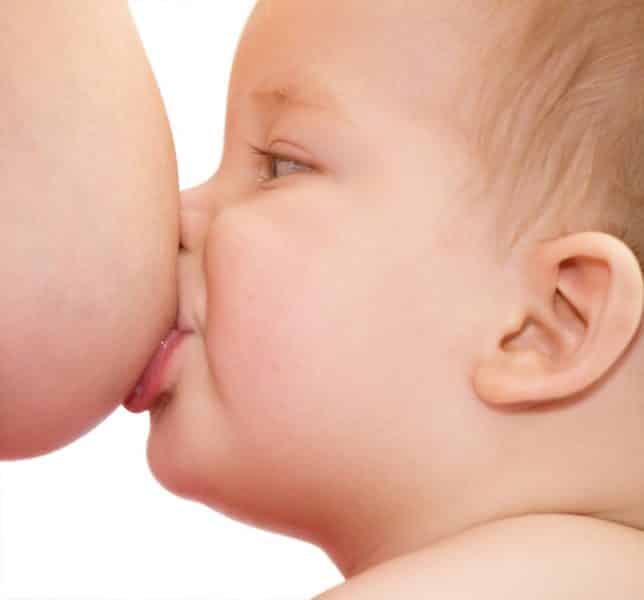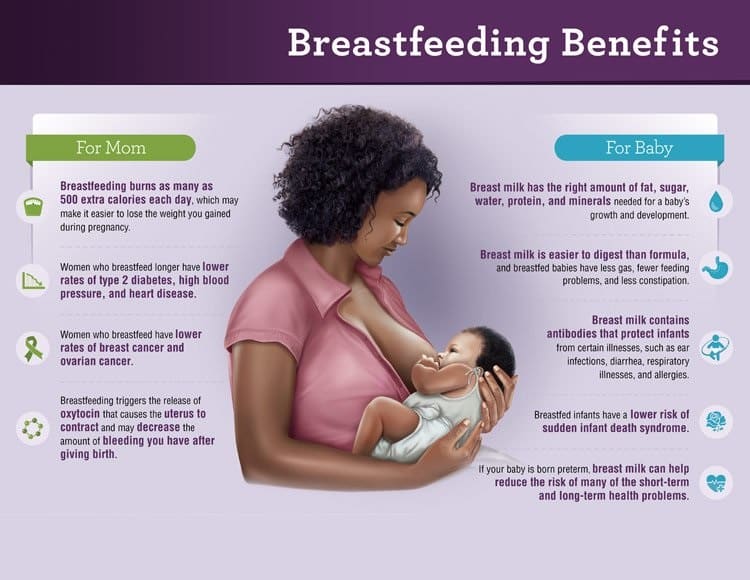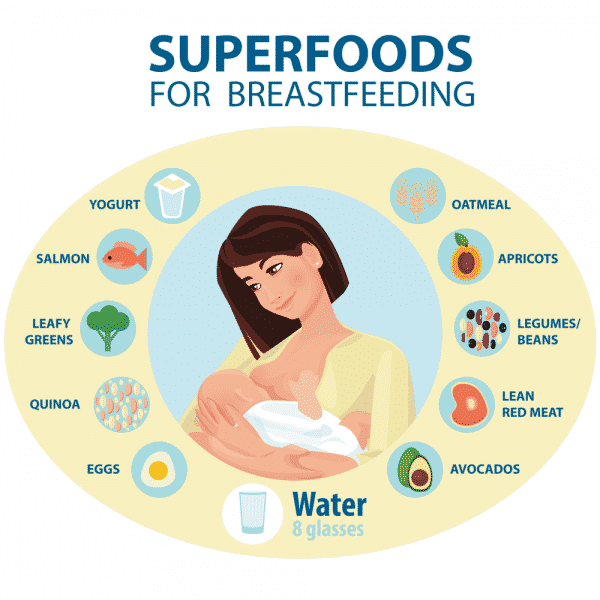There are many benefits of breastfeeding; it is the ideal feeding method for most babies, but there are some situations when breastfeeding is not recommended.
Breastfeeding has multiple benefits, including mother and child bonding, nutritional support, and a healthier baby.
Breastfeeding is healthy for both the mother and child. Breast milk contains antibodies that protect the baby from getting sick, spreading germs and even causing sudden infant death syndrome, or SIDS.
Benefits of Breastfeeding for Baby
Before we talk about the benefits of breastfeeding, you should know that it may be the most natural and convenient way of feeding a baby, but many moms need time to figure out what they are doing.
Breast milk can lower the risk of ear infections, atopic dermatitis, asthma, type 1 diabetes, leukaemia, necrotizing enterocolitis and respiratory diseases.
Breastfeeding can help protect the mother from postpartum depression, or PPD, breast cancer, type 2 diabetes, and ovarian cancer. As you can see, the health impact is tremendous.
Colostrum, a thick, yellowish fluid secreted from the breast during pregnancy and the first few days after birth, is packed with nutrients and antibodies.
This fluid will give your baby its best start. Your baby will only get a small amount of colostrum, but it will match its little stomach.
Around days 3 to 5 after birth, your milk starts to change as the baby’s needs begin to change.
Your breast milk will become thinner; there will be more fat, protein, and sugar to help your baby as it begins to grow.
At this time, there are still tons of antibodies and nutrients to help protect the infant.
Breast milk contains vital components to keep your child healthy and is much easier to digest than cow’s milk and baby formula.
Breastfeeding can save you a lot of money. Anywhere from $1,500 to $4,000. Not to mention breastfeeding is much easier than mixing formula.
Benefits of Breastfeeding for Baby
When you have a child, saving money is always a good thing; it can be quite an expense.
You can also offset extra medical bills by having a healthier baby and save on the emotional expense of not having to worry.
When breastfeeding requires you to spend quality time with your child, infants are tiny little sponges that take in various new feelings, emotions, and experiences.
When breastfeeding, your child makes them feel relaxed, safe and secure. A benefit of breastfeeding for the mother is self-confidence as well as an enhanced bond with their baby.
Breastfeeding will also satisfy an infant’s hunger almost instantly.
As you can see, breastfeeding has multiple benefits that should not be discouraged.
Always consult with your doctor, but in most cases, breastfeeding your child is usually the best way to have a happy and healthy baby.

In some situations, mothers have to use formula, but for most, they are naturally equipped with everything they need.
Like any new dance partner, you and your baby need the chance to learn to read one another’s cues and respond to one another’s rhythms while trying to figure out the basic dance steps simultaneously.
During those early weeks, a period of round-the-clock marathon feeding sessions when you’re flipping your baby from breast to breast.
Changing your baby’s diaper and getting a little sleep before you start the whole cycle again, you may wonder if breastfeeding will always be this demanding and if your life will always be this chaotic.
Fortunately, it won’t. At around the six-week mark, the tide suddenly turns, and things are looking up big-time.
Benefits of Breastfeeding for babys’ Physical health
Breastfeeding reduces the incidence and severity of :
- Diarrhoea
- Lower respiratory infection
- otitis media (ear infection)
- Bacteremia (an invasion of the bloodstream by bacteria)
- Bacterial meningitis (a condition that causes infection of the membranes covering the brain and spinal cord)
- Botulism (food poisoning)
- Urinary tract infections
- Necrotizing enterocolitis (a gastrointestinal disease that affects mainly premature infants) Breast-feeding may provide some protection against
- Infant mortality in general
- Sudden infant death syndrome (SIDS)
- Insulin-dependent diabetes mellitus
- Crohn’s disease
- Ulcerative colitis
- Lymphoma
- Allergic diseases
- Chronic digestive diseases
- Heart disease and stroke
- Cavities and orthodontic problems
Benefits of Breastfeeding for newborn
Emotional health benefits for babies
Breastfeeding provides regular opportunities for skin-to-skin contact between mother and baby, encouraging emotional security and mother-child bonding.
Developmental benefits for baby
Breastfeeding is the natural way to ease a baby’s transition from life inside the womb to life outside the womb and to encourage that baby’s optimal development.
Breastfeeding promotes healthy cognitive development—school-age children who were breastfed during infancy score higher on cognitive and intelligence tests than their formula-fed counterparts.
Breastfeeding encourages healthy eating habits. Breastfed babies have greater control over the amount of food consumed at each serving, so breastfeeding may lay the groundwork for healthy eating habits.
Benefits of breastfeeding for mothers Physical health

Breastfeeding boosts oxytocin levels, reducing the amount of postpartum bleeding and encouraging the mother’s uterus to return to its pre-pregnancy size more rapidly.
Exclusive breastfeeding reduces the risk of anemia by delaying the return of the first post-pregnancy menstrual cycle by 20–30 weeks.
Another benefit of breastfeeding is that it reduces the rate of maternal obesity. Breastfeeding moms are more likely to return to their pre-pregnancy weight than mothers who are not breastfeeding.
They are also less likely to become obese. Breastfeeding delivers significant health benefits later in life. Women who breastfeed their babies are less susceptible to ovarian cancer, premenopausal breast cancer, and osteoporosis.
Emotional health benefits of breastfeeding for mothers
Breastfeeding can help to ease the transition to motherhood by making motherhood easier. Not only is it a more convenient method of feeding a baby, but it’s also a unique mothering tool.
How Breastfeeding Is Beneficial for Mothers
Hormones associated with breastfeeding (prolactin, oxytocin, and others) reduce anxiety and promote a sense of well-being (the much talked about breastfeeding high).
An instinct to reach out to other mothers for support (the “tend and befriend? stress response) and a powerful bond with your baby.
Mothers who breastfeed their babies exclusively may also experience a delayed resumption of ovulation, which may allow for an increased gap between children, which is one of the most benefits of breastfeeding.
BREASTFEEDING FOOD FOR THOUGHT
Your healthcare provider is likely to advise against breastfeeding if:
- Aby is diagnosed with galactosemia (a rare genetic disorder in which babies are born without the liver enzyme required to process the simple sugar galactose, which is found in all kinds of milk, including breast milk)
- you are an illegal drug user
- untreated, active tuberculosis
- infected with human immunodeficiency virus (HIV)
- using a medication that is not considered safe for use by breastfeeding mothers.
If it is necessary for you to take medication while you are breastfeeding, your healthcare provider will weigh the benefits of breastfeeding against any known risks to the baby.
In cases where a breastfeeding mother does not recommend a particular medication, your healthcare provider may suggest an alternative medicine that is less harmful.
The truth about the benefits of breastfeeding

Some people are reluctant, to be frank with new moms about the potential challenges of breastfeeding, fearing that if they tell it like it is,
a would-be breastfeeding mother might be inclined to give up on breastfeeding without even trying.
Others argue that an informed mother is empowered: by giving mom-to-be a heads-up about breastfeeding challenges so they can arrange for additional support.
They may need at home or research the additional supports available to them in the community.
How Can I Tell Whether or Not Breastfeeding Is Working?
Lactating moms have to use sensible methods of measuring their babies’ milk intake. Here’s what to look for:
- You can hear your baby making swallowing sounds while she is nursing.
- Your baby is breastfeeding eight to 12 times every 24 hours.
- Infant produces six wet diapers and a couple of complete bowel movements every 24 hours (bowel movements can vary quite a lot from baby to baby. So don’t panic about this particular wellness sign if your baby is otherwise thriving; discuss her patterns with her healthcare provider).
- Your child is gaining weight. (It’s normal to lose weight during the first few days after birth, but this initial weight loss should turn around quickly as breastfeeding becomes established.)
Do I Need to Introduce a Bottle to My Breastfed Baby?
It depends. If you expect to be away from your baby for extended periods (e.g., long enough that your baby may miss a feeding), consider introducing a bottle.
More benefits of breastfeeding. Other methods of feeding a breastfed baby when the mom is unavailable; are less convenient than bottle-feeding. These methods include providing your baby from:
- A miniature cup that is designed for this purpose (Medela sells such a cup)
- A spoon
- A dropper
- A sippy cup with a soft spout
- A lactation aid (a tube that can be taped to your breast or someone else’s finger)
Can Foods That I Eat Make My Baby Fussy?

In some cases, yes. Babies can have pretty discriminating tastes. Some of the foods that can make babies edgy, cranky, or downright colicky include caffeine.
but you have to overdo it with most babies to get a reaction, so don’t give up your Starbucks habit yet); citrus fruits (look for a runny nose, diarrhoea, a skin rash, hives, or excessive spitting up, fussiness)
Dairy products (gas, rashes, a runny nose, congestion, fussiness); eggs, gluten (wheat, rye, oats), corn, fish, nuts, soy (diarrhoea, rashes, hives, runny nose, spitting up); gassy vegetables (onions, garlic, broccoli, cauliflower
Spicy foods (which can change the flavour of your milk). Don’t go crazy trying to eliminate all of these foods from your diet, or you’ll be on the “Grumpy Mom Diet. Before you know it.
Try to figure out what might have caused the problem and then eliminate that food or food group for two weeks. Then gradually reintroduce it and see if you notice a change in your baby’s symptoms.
How Long Should I Breastfeed My Baby?
We recommended that babies be exclusively breastfed for six months and breastfed even after solid foods have been introduced, for as long as the mother and baby are willing.
While your baby is mastering the mechanics of eating solids and getting used to all those new tastes and textures, breast milk will continue to be the mainstay of her diet.
Do Breastfed Babies Need to Drink Water?
You can give your baby water when she’s eating various solid foods.
At that point, you can give her a bit of water in a sippy cup so that she can practise drinking from it.
Even then, this is more about sippy cup skill building than her needing water per se.
Will she still be getting plenty of liquids from her diet, from breast milk and the puréed “solid? Foods she’ll be eating by this time.
Should You Wean from Breast to Formula or Straight to Cow’s Milk?

Infants who stop breastfeeding before age 12 must switch to iron-fortified infant formula rather than cow’s milk.
A baby’s system isn’t mature enough to digest all the minerals and proteins in cow’s milk.
There’s an increased risk that your baby will become sensitized (hypersensitive) to the milk protein in cow’s milk if you switch to cow’s milk too soon.
What’s on the Infant Formula Menu?
You’ve decided to offer your baby formula, so how do you choose a recipe?
While the number of choices may seem overwhelming, your formula options include the following.
• Milk-based formulas:
Milk-based formulas are recommended for full-term and preterm infants who don’t have any special nutritional needs.
They are made from regular cow’s milk, but much of the protein found in cow’s milk has to be removed so that babies’ livers and kidneys can digest the formula.
There is also a new generation of hydrolyzed cow’s milk formulas available for babies who have had difficulty digesting the protein in cow’s milk. (The protein is predigested.)
• Soy protein formulas:
Soy formulas are recommended for lactose intolerant infants, who have a milk protein allergy, or who cannot drink standard cow’s milk-based formula for other (religious or cultural) reasons.
These formulas are derived from soy protein rather than cow’s milk protein.
However, soy protein is not a suitable choice for all infants, as some babies are allergic to soy.
Some animal studies have indicated that exposure to soy may have long-term effects on rats’ fertility and sexual development.
(No such effects have been found in humans, but these kinds of studies tend to make people, especially parents, understandably nervous, so some parents have decided to steer clear of soy for now.)
• Formula for premature infants:
These types of formulas are designed to encourage rapid growth in premature babies.
• Specialized formulas:
There are a variety of specialized formulas designed to meet the needs of infants with metabolism problems, heart disease, and other medical conditions.
Some of the more specialized formulas are available only by doctor’s prescription.
Most formulas are fortified with iron (critical for infant development), and some manufacturers are now adding DHA (docosahexaenoic acid) and ARA (arachidonic acid), also known as omega 3 and 6 fatty acids.
These fatty acids contribute to brain and eye development; DHA and ARA naturally occur in breast milk.
Some babies have become seriously ill because their parents didn’t understand how to mix, store, and heat infant formula if you intend to give your baby infant formula.
Review the instructions below and carefully research the formula preparation instructions for each formula brand. Here are the key points to remember:
Read the formula preparation instructions carefully. If you over-dilute your baby’s formula, she won’t be getting enough calories per serving.
If her formula is diluted, your baby’s biochemistry could be thrown seriously out of whack, leading to dehydration and kidney problems.
Pay careful attention to hygiene when preparing and storing infant formula. Sterilize all feeding equipment until your baby is at least five months old. Boil your formula-making supplies for about five minutes.
Then tightly seal and refrigerate the prepared bottles of formula in the refrigerator. Use all recipes within 24 hours. Discard any unfinished formula from your baby’s bottle.
Don’t change from one formula to another just because a particular brand is on sale. If you find a brand that agrees with your baby, stick with that brand. It’s worth paying a little extra to give your baby some gastrointestinal stability
Bottle-Feeding Basics
Don’t heat your baby’s bottle in the microwave. As tempting as it may be to opt for the speedy route, the safest way to heat a bottle is in a pan of hot water.
If you heat a bottle in a microwave oven, your baby’s mouth could be scalded by a “hot spot of liquid.
· Use a baby-friendly feeding position when it’s time to feed your baby. Hold her in the cradle position (neck cradled in the crook of your arm with her head tilted back slightly).
Hold her bottle up so that the nipple is full of liquid, which will minimize the amount of air that your baby swallows during feeding.
Burp your baby frequently during the early weeks to get rid of any air that your baby swallows during feeding.
· Never prop a bottle. It poses a choking hazard and deprives you and your baby of time that might otherwise be spent cuddling and getting to know one another.
Having a Breastfeeding Goal Can Help You Stay on the Course
Setting a breastfeeding goal for yourself can help to get you over the rough patches.
That goal might be to breastfeed for six weeks, six months, a year, or until your baby weans herself.
Advertisements
It may be to try breastfeeding for today only and see what happens next. All those benefits of breastfeeding are lovely and worthy.




